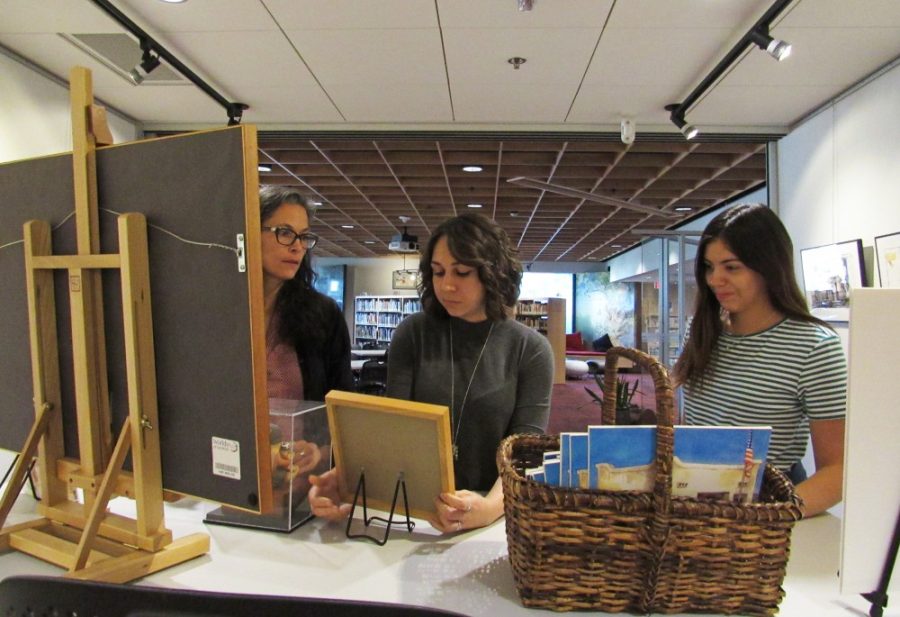In “Fahrenheit 451,” Ray Bradbury said, “You don’t have to burn books to destroy a culture. Just get people to stop reading them.” For Rebecca Ballenger, this message resonates a hundred times over.
As Collections and Outreach coordinator at Worlds of Words, Ballenger organizes materials, events and exhibits at the extensive global literature resource center housed in the UA Education building in order to connect the Tucson community with their exclusive collection of global children’s books and artwork.
Ballenger worked at Worlds of Words when it was just a startup, originally putting down roots in a hidden basement space in the same building. It all began when Kathy Short, a professor in the College of Education, donated her personal collection of global children’s books to the UA and created a place to share them with the education community.
Searching for a change, Ballenger left Worlds of Words and pursued work in a private business setting, where she found a job as a web editor and social media manager at Bookmans. She later returned to Worlds of Words.
RELATED: Festival of Books showcases literacy in Tucson
“It was a lot of fun, but then I came back because my predecessor retired and I could not get the mission of Worlds of Words out of my blood,” Ballenger said.
Fast forward to today, Worlds of Words thrives in a newly renovated wing on the fourth floor and is run by Short, Ballenger and numerous student workers and interns. Worlds of Words has established a website where it regularly produces online publications and has joined social media on most major platforms.
By returning to her old job, Ballenger was able to immerse herself in a community that is driven to cultivate knowledge about other cultures through books. She helps pre-service teachers, art students and researchers connect with foreign children’s literature and artwork. These pieces are then used in classrooms to expand the minds of students by introducing a different perspective.
Ballenger said her favorite part of her job is the patrons.
“We’re at an institute of higher education and we’re located in the College of Education, so watching that fostering of learning is really inspiring and it pushes me to continue learning myself,” Ballenger said.
Ballenger said she grew up in a relatively homogenous community, but when she went to college, she took an intercultural communications class that sparked her love for the insight other cultures can provide.
“I realized they were approaching all of these things in different ways, and it really opened my mind,” Ballenger said. “It was such an exposure; it was so interesting and fascinating to me.”

During this same time in her life, the internet was just becoming widely available to the public. Her generation suddenly had the world at their fingertips. This is where she discovered the opportunity to virtually “travel to another country” and be connected to another culture’s history, customs, literature and artwork. Ballenger’s interest in foreign communities expanded immensely, and she fueled this interest with her passion for literature.
“I think I just hit that right time where technology and my higher education met, and it gave me a window to the world,” Ballenger said.
As a coordinator, Ballenger works to provide a similar connection of technology, education and interactive activities to draw students in and fully immerse them in the books at Worlds of Words.
Providing a student with the books is one thing, but Ballenger takes it a step further by helping to curate exhibits and events that showcase not only the important books of foreign literature but also the process that the author/illustrator of these books went through to create their work.
“It’s an opportunity to invite the community to come in and take a look at this whole process that we’ve made transparent,” Ballenger said.
At these exhibits, young students can look at exclusive samples of literature and art from around the world. This literature is displayed for them in a way that is easy to understand and visually intriguing, and they can play interactive games with these themes that help them solidify the information.
Currently, the Worlds of Words is showcasing an exhibit on Joan Sandin’s “Coyote School News.” The original children’s picture book is displayed along with other materials that show the step-by-step process of creating a piece of literature.
“Joan Sandin traveled all over Southern Arizona taking pictures to use as reference for her art, she conducted interviews with students of ranch schools and did tons of other research,” Ballenger said.
RELATED: Professor and faculty represent UA at Tuscon Festival of Books
The exhibit also shows the editing and publishing process of literature. Ballenger said it was important to include this aspect of “Coyote School News” to show that picture books are more difficult to create than one would expect.
Worlds of Words will host two “book fiestas” in the next few weeks, presenting literature, artwork and activities from Russian and Indian cultures. These events will take place on Saturday, April 22, and Saturday, May 6, from 10 a.m. to noon.
While reflecting on the pieces housed inside Worlds of Words, Ballenger said, “What Bradbury really wanted us to get was not that it’s bad to burn books but that if you don’t read books, they lose their power. To make our collection more powerful, we need to show it to people.”
For more information about upcoming events, projects and the mission of Worlds of Words, visit wowlit.org.
Follow Kathleen Kunz on Twitter.









